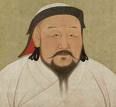
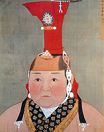


1260 The original Ahnuld in End of Days? Millennium Fever is at a peak this year, stirred by Joachim of Fiore's predictions that this is the year when Antichrist comes; meanwhile ex-Dominican monk Brother Arnold causes hysteria by claiming that the Church is corrupt and the Antichrist is the pope, and that Christ will soon judge him and the clergy; meanwhile the first Flagellant movements begin in S Germany and N Italy - whip it, whip it good? Speaking of parts west? On Mar. 1 after the Mongol forces of Hulagu Khan combine with the Franks under Bohemond VI of Antioch and the Cilician Armenians under Hetoum I and capture Aleppo, they hook up with Hulagu's Christian Turkish gen. Kitbuqa (-1260) and capture Damascus, celebrating Xmas Mass in the Grand Mosque of the Umayyads (formerly the Cathedral of St. John the Baptist), profaning numerous mosques and sacking Jerusalem; An-Nasir Yusuf is KIA by Hulagu, and the Ayyubid Dynasty (founded 1171) becomes kaput, continuing in name only, with the Muslim power center in Cairo not Baghdad or Damascus; meanwhile the death of Great Khan Mongke causes Hulagu to leave for Karakorum to help decide who will succeed him, and he leaves only 10K horsemen in Syria under Kitbuqa to occupy it, who raids as far S as Ascalon and Jerusalem, and stations a garrison of 1K in Gaza and another in Naplouse. On May 5 Kublai Khan (1215-94), grandson of Genghis Khan succeeds his brother Mongke (Mangu) as Great Khan of the Mongol Empire in N China and parts W, founding the (Great) Yuan Dynasty of China (ends 1368), after first moving the capital to the new city of Shangdu (Xanadu) while squabbling over secession; the Yuan dynastic name is officially adopted in 1271. On May 14 the Battle of Druim Dearg (Down) near Downpatrick, modern-day County Down, Ulster, North Ireland sees recently self-declared high king of Ireland (since 1258) Brian mac Neill Ruaidh Ua Neill (b. ?) KIA along with several Ui Cathain chiefs incl. Aedh Ua Conchobhair by a mercenary army of Irish Gaelic soldiers working for the Normans, ending the O'Neill revolt. On Sept. 3 after the Mamluks take advantage of the absence of Hulagu to move on them, the Mongols offer an alliance with the Franks, but Pope Alexander IV forbids it, and Count Julian Grenier of Sidon (-1275) (son of Balian I and Margaret of Brienne) causes the death of a grandson of Kitbuqa, causing him to sack Sidon, pissing-off the Christians so bad that they allow them to pass through Crusader territory, 10K-20K Egyptian Mamluks defeat and wipe out 10K Mongols in the Battle of Ain (Ayn) Jalut (Arab. "Spring of Goliath") (Heb. "Spring of Herod) in the Palestinian desert in the Jezreel Valley near Ein Harod (near Nazareth), becoming the first Mongol D that isn't avenged, forever defining the SW limit of Mongol expansion as the Tigris River; Kitbuqa is executed; Syria suffers severely from the Mongol invasion, worsened by subsequent invasions in 1281 and 1299; the Egyptians use portable hand cannon (midfa) using gunpowder cartridges charged with 2-3-15 (sulfur-carbon-saltpeter) gunpowder; on the way back to Cairo Al-Zahir al-Malik Baybars (Baibars) (Arab. "panther") (1223-77) AKA Abu al-Futuh (Abu l-Futuhat) (Arab. "father of conquest") murders Sultan Qutuz, and becomes Bahriyya sultan #1 of the Mamluk Empire (until July 1, 1277); the Kipchak Turkish Mamluks (Mamelukes) (Arab. "possessed", "owned") seize control of the Egyptian sultanate, ruling Egypt until 1517, and continuing as vassals of the Ottoman Empire until 1811, becoming known for kicking the Franks out of Palestine, and kicking the last Crusader's butt out of Asia; the Bahriyya (Bahri) Sultanate of the Mamluk Empire (ends 1382) is founded, becoming the leading Muslim state, integrating and ruling the Syrian provinces in 1271-1516 while recruiting Mamluk soldier-slaves from the Caucasus, which causes ethnic tensions between Turks and Circassians (known for their beautiful babes); Cairo becomes the richest city W of the Indus River until 1300, with public works erected by exploited peasants; the usual form of succession is assassination; Christian participation in the 1258 Mongol invasion of Baghdad et al. cause the Muslims to begin a persecution, ushering in a "devastating reversal of Christian hopes... [and] the... decisive collapse of Christianity in the Middle East and much of Africa" (Colin Chapman); by the middle of this decade Western Christians wake up and begin accepting Mongol feelers about a Franco-Mongol Alliance against the greater threat of the Muslims, the Mongols promising them Jerusalem in return for cooperation; too bad, despite several pro-Christian Buddhist Mongol khans sending embassies, it never happens, perhaps because the Christians demand their conversion first, giving Islam time to slam-dunk and convert them. On Sept. 4 the Battle of Montaperti (bloodiest battle in medieval Italy) near Siena sees 20K pro-HRE Ghibellines of Siena, aided by German mercenary heavy cavalry sent by Manfred I of Sicily defeat 33K pro-papal Guelphs of Florence and Tuscan allies after Florentine traitor Bocca degli Abati hacks off the hand of the Florentine standard bearer, causing the Florentines to flee, losing 15K KIA; the German soldiers call on St. George during the battle, and later build the Church of San Giorgio in Pantaneto; Dante later condemns Abati to the 9th Circle of Hell, even though his own mother's name is Bella degli Abati? Ottokar II defeats Bela IV of Hungary and takes the province of Styria. Alexander III takes personal control of the Scottish govt., while bad weather, food shortages and famine plague his kingdom; he travels to England with his pregnant wife Margaret to demand payment of her dowry, now nine years late, and gets his father-in-law Henry III to make promises to pay; he then returns to Scotland, leaving his wife behind to have the child, Margaret Dunkeld (1261-83) next Feb. The two grandsons of Bernhard of Ascania divide the diluted duchy of Saxony (since 1181) into Saxe-Wittenberg, which incl. the city of Wittenberg beyond the duchy's original boundaries, which later receives the electoral privilege. Turkoman leader Karaman ibn Musa founds the principality of Karaman in the foothills of the Taurus Mts. in SC Anatolia, rivaling the Ottomans until they annex it in 1468. Bergen-op-Zoom at the confluence of the Zoom and E Scheldt Rivers in N Brabant is founded, becoming a commercial rival of Antwerp until the 16th cent., when a new delta system in the Scheldt cuts it off. Torgau in E Germany is chartered about this time. Niccolo Polo and his brother Maffeo Polo travel to the court of Kublai Khan in Bukhara (until 1263). Between this year and 1347 80 banking firms open in Florence, enriching Euro vocabularies with banking terms incl. banco, credito, debito, cassa (money box) (cash), conto/disconto, conto corrente, netto, bilanza (balance), and banca rotta (bankruptcy). The College of Valladolid in Spain is founded, and raised to univ. rank in 1346. The first Mastersinger School is founded in Mainz, Germany. About this time Bolognese poet Guido Guinizelli (1235-76) founds the Dolce Stil Nuovo (Ital. "Sweet New Style") school of Italian love poetry, led by Guido Cavalcanti (1255-1300), Lapo Gianni (-1329), Cino da Pistoia (1270-1337), and Brunetto Latini (1220-94); in 1283 18-y.-o. Dante Alighieri joins and becomes a leader of the Florentine Circle. About this year the Borzoi (Russian Wolfhound) breed of sight hound is created in Russia from a cross between a Saluki and native Russian breed, or by crossing an Arabian greyhound with a Russian collie; they become a favorite of the Russian tsars. Sports: Henry III of England forbids the clergy from playing chess. Architecture: Chartres Cathedral (begun 1134) in France is consecrated on Oct. 17. Nicola Pisano designs the pulpit of the Pisa Cathedral Baptistery. Burgos Cathedral (begun 1221) is consecrated. Inventions: The cannon (gun) is invented by Konsantin Anklitzen. Science: In this decade English scientist Roger Bacon (1214-94) uses a camera obscura to observe solar eclipses. Art: Cimabue (1240-1302), Madonna (Trinita, Florence). Nonfiction: In this decade the Second Pskovian Chronicle is written, containing the soundbyte about their hero Alexander Nevsky: "He was taller than the others, his voice was like a trumpet, and his face was like that of Joseph, whom the Pharaoh placed second after him. His power was like Sampson and his wisdom like Solomon. Prince Alexander defeats but is never defeated." Poetry: Konrad von Wurzburg (1225-87), Engelhard (epic). Births: Mongol noblewoman-wrestler Khutulun ("moonlight") (AKA Aigiarne, Aiyurug, Khotol Tsagaan, Ay Yaruq) (d. 1306; daughter of Kaidu, cousin of Kublai Khan. French chamberlain-minister (to Philip IV) (1304-14) Enguerrand de Marigny (d. 1315) in Lyons-la-Foret, Normandy. French surgeon and anatomist Henri de Mondeville (d. 1320). German mystic theologian and Dominican monk Meister Johannes Eckhart (d. 1327); combines Aristotelianism, Neoplatonism, Islam, and Judaism into his own brew of Christianity. Polish king (1320-33) Wladyslaw (Ladislaus) I Lokietek (the Short) (the Elbow-High) (d. 1333); father of Casimir III the Great (1310-70). Italian antipope (1328-30) (Franciscan) Nicholas V (Pietro Rainalducci) (d. 1333) in Corvaro (near Rieti), Lazi. English poet-chronicler (Gilbertine monk) Robert Mannyng (de Brunne) (d. 1340) (1275-1338?) in Brunne (Bourne), Lincolnshire. Italian Roman Catholic Servite priest (St.) Peregrine Laziosi (Pellegrino Latiosi) (d. 1345) in Forli; feast day: May 2. Deaths: French trouvere Richard de Fournival (b. 1201); leaves Bestiaire d'Amour (Bestiary of Love), Commens d'Amoure, Poissance d'Amore, Amistie de Vraie Amour, and The Vetula (verse romance which mentions chess).


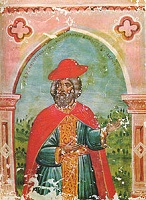
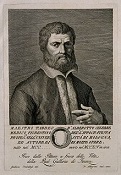
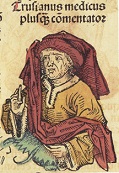
1261 On May 25 Pope (since 1254) Alexander IV dies, and on Aug. 29 Jacques Pantaleon, patriarch of Jerusalem (since 1255) (born in Troyes, France) is elected Pope (#181) Urban IV (-1264), bitterly opposing King Manfred of the Two Sicilies and favoring Count Charles of Anjou and Provence; after getting over the shock of losing Constantinople, he restores order in the papal states and works to create alliances with rulers of cities and states and weaken German influence. On June 13 fugitive Abbasbid prince Al-Mustansir (Abu al-Qasim Ahmad) is crowned as Mamluk caliph in Cairo, and the sharif of Mecca transfers his allegiance to Cairo, making the Mamluks the guardians of the holy cities of the Hijaz, confirming their #1 status in the Muslim world; on Nov. 28 he is killed by the Mongols in an anbush near Hit in modern-day Iraq, and next Nov. 21 he is succeeded as Abbasid caliph #2 of Cairo by his distant Abbasid relative Al-Hakim I (1247-1302) (until Jan. 19, 1302), who had already been proclaimed caliph in Aleppo after escaping Baghdad in 1258 to Damascus and was almost proclaimed after befriending Arab tribal chief Isa ibn al-Muhanna. Build muscle, slim fat, lose weight? On July 25 after making an alliance with the Bulgarians and concluding the 1261 Treaty of Nymphaeum (Nymphaion) with Genoa on Mar. 13, promising them the privileges enjoyed by the Venetians, and catching the Venetian fleet away and crossing the Bosphorus Strait with a Greek army under Gen. Alexius Comnenus Strategopoulos, Nicaean emperor (since 1259) Michael VIII Palaeologus (Palaiologos) (1223-82) surprise-attacks Constantinople, entering the city through a secret passage and recapturing it without much difficulty from the hated Latins, ending the Latin Empire (founded 1204), and restoring the Byzantine Empire in a downsized version under Nicaean leadership after its 57-year exile; Baldwin II wakes up, flees after forgetting to take his scepter and crown with him, and boards a Venetian galley, which heads to Negropont, Athens, Apulia, and France, retaining his title of Latin emperor of Constantinople while sponging off Charles of Anjou, who takes over Sicily in 1267, diverting him from recapturing Big C; the Palaeologan (Palaiologos) Dynasty, the last Byzantine dynasty is founded (ends 1453), finally officially adopting the old Roman double-headed eagle as the official armorial (ending up turning the Byzantine Empire into a subject for paleographists and paleontologists?); after being left behind in Nicaea and blinded on Dec. 25 (his 11th birthday) to make him ineligible for the throne, John IV Ducas Lascaris (b. 1250) is exiled and imprisoned in a fortress in Bithynia, after which Michael VIII marries off his sisters to two Italians and a Bulgarian noble so their descendants can't threaten the imperial succession; despite an attempt to keep the blinding secret, the news comes out, causing Patriarch Arsenios to excommunicate him until the appointment of Patriarch Joseph I in 1268; former emperor Baldwin II escapes to Italy and transfers his claims on the throne of the Latin Empire of Romania (East) (Constantinople) to Charles of Anjou (1226-85) (youngest son of French king Louis VIII); the duchy of Athens continues for the next two cents., controlled in turn by French, Spanish, and Italian rulers, becoming one of the most brilliant feudal courts of Europe in the 14th cent. Henry III persuades Pope Urban IV to release him from his promise to support the Provisions of Oxford, and to declare the enactments of the barons since 1258 null and void; the English govt. is split into two camps, and civil war brews. Greenland voluntarily comes under Norwegian rule. Alexander III of Scotland sends a delegation to Haakon IV in Bergen to seek a solution as to who controls the Hebrides, but he refuses to negotiate and war looms. Turkoman leader Mentesh Bey founds the principality of Menteshe in W Anatolia (ancient Caria) after conquering Byzantine ports and lands, with capital at Milas (Mylasa) in SW Anatolia; it is absorbed by the Ottomans in 1390. Florence, Italy-born Taddeo Alderotti (Thaddeus Florentinus) (1206-95) begins teaching medicine at Bologna U., becoming the first to organize a medical lecture at a univ. and helping the renaissance of learned medicine in Europe; he also invents fractional distillation; Dante disses him for pursuing learning for wordly instead of spiritual reasons like St. Dominic; his student Turisanus de Turisanus (Pietro Torrigiano de'Torrigani (-1320) teaches medicine in Paris in 1305-19, becoming the first medieval Euro physician to propose his own theory about human blood and its role. About this year Roger Owen (-1280) is appointed as the first King's Serjeant-at-law at the Irish Bar. Nonfiction: Anon., The Slavonic Josephus; an alleged original version of Josephus that describes Jesus as a human political revolutionary, a "king who did not reign", who had "a line in the middle of his head in the manner of the Nazireans"; it was in the time of Constantine I the Great that Josephus got doctored to turn Jesus into the Messiah? Births: English bishop of Exeter (1308-26) Walter (de) Stapledon (d. 1326) on Feb. 1 in Annery, Devonshire. Norwegian queen consort (1281-3) Margaret Dunkeld, Maid of Scotland (d. 1283) on Feb. 28 in Windsor Castle, Berkshire, England; daughter of Alexander III and Margaret of Scotland; wife of Eric II; mother of Margaret the Maid of Norway (1283-90). French duke of Brittany (1305-12) Arthur II (d. 1312) on July 25; eldest son of John II (1239-1305) and Beatrice (daughter of Henry III of England and Eleanor of Provence). Portuguese king #6 (1279-1325) Dinis (Denis) I (the Farmer) (the Poet) (d. 1325) on Oct. 9; eldest son of Afonso III (1212-79) and Beatrice of Castile; grandson of Alfonso X the Wise of Castile; husband (1281-) of St. Elizabeth of Aragon; father of Afonso IV (1291-1357). Persian Sufi cleric cleric Ahmad (Ala ud-Daula) Simnani (d. 1336) in Semnan; student of Abud al-Rahman Asfariyeni; teacher of Ashraf Jahangir Semnani and Mir Sayyid Ali Hamadani; founder of the Kubrawiya (Kubrawi) Sufi Order in Khurasan and Transoxiania, which attempts to unite Sunnis and Shiites and win Mongol converts.
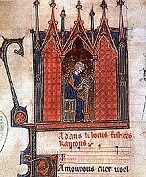
1262 On Mar. 8 the citizens of the free imperial city of Strasbourg win a battle against their bishop at the Battle of Oberhausbergen, winning their freedom from episcopal authority; meanwhile the Jews in nearby Hagenau get Richard IV to specially confirm their privileges in a new city charter, which reads: "We desire and ordain that the Jews of Hagenau, serfs of our imperial chamber, according to our letters patent, be subject only to our chamber and our orders. No one may subject them to uncustomary service, or transgess our law without incurring our disfavor". On July 14 Richard de Clare, 5th earl of Hertford (b. 1222) dies in Waltham, Canterbury after clearing the Welsh rulers from the W valleys of Glamorgan as far as the Rhondda River, allowing Llywelyn Ap Gruffydd to move up the Usk River Valley, capture the Brecon lands of Humphrey de Bohun, guardian of de Clare's young heir all the way to the N edge of Glamorgan, and start a push giving him mastery of most of modern-day Wales except the S coastal plain. Iceland loses a 50-year civil war along with its independence to Norway when the latter's King Haakon IV the Old intervenes; Norway also annexes Greenland (until 1397). The Christians siege Niebla, Spain, and the Moors use cannon again (first time 1248). Hulagu Khan returns and masses his armies to attack the Mamluks to avenge the 1260 D at Ain Jalut, but is drawn into a civil war with Batu Khan's brother Berke (Birkai) Khan (-1266), leader of the combined Blue and White Hordes, a Muslim convert who wants to avenge Hulagu's sack of Baghdad and allies with the Mamluks, becoming the first Mongol civil war, ending their unity; his gen. Nogai ("dog") Khan (Isa Nogai) (-1299) (great-great-grandson of Genghis Khan) begins raiding Hulagu's territories; meanwhile Hulagu sends an embassy to "all kings and princes overseas" led by his secy. Rychaldus (Richardus) to strike a Franco-Mongol Alliance against the Mamluks, but King Manfred of Sicily, who is allied with the Mamluks against Pope Urban IV intercepts and returns him; on Apr. 10 Hulagu sends a letter to French king Louis IX via John the Hungarian offering an alliance, promising them Jerusalem in return for sending a fleet to Egypt, but it either doesn't arrive or isn't answered, although John does reach Pope Urban IV, who next year sends the letter Exultavit cor Nostrum to Hulagu, telling him that Latin Jerusalem patriarch William II of Agen will investigate his desire to be baptised as a Christian via a papal rep. Alexander Nevsky convinces the Tartars to reduce tributes and eliminate conscription. Aching William II de Villehardouin of Achaea is released from captivity by the Byzantine emperor after handing over his key fortresses of Monemvasia and Mistra, leaving him with little power. Prince Dmitri of Novgorod sieges, captures, and destroys Tartu, Estonia, but fail to capture the Bishop's Fortress, allowing the inhabitants to build a 2km stone wall around it that becomes a refuge for German merchants and artisans. Norwegian King Haakon IV sends a gift-bearing envoy to the Muslim sultan of Tunis, who reciprocates. Siena, Italy passes a death penalty for homosexuals. Sports: The Russian word "shakmatny" (mate of the shah) (checkmate) for chess is coined. Music: Adam de la Halle (1237-88), Le Jeu de la Jeuillee; the first French operetta. Births: English adviser (bi?) Hugh le Despenser the Elder, Earl of Winchester, 1st Earl of Winchester (d. 1326) on Mar. 1; son of Hugh le Despenser II (1223-65); father of Hugh le Despenser the Younger (1286-1326); created earl in 1322. Hungarian king (1272-90) Ladislaus (Ladislas) (Laszlo) IV the Cuman (d. 1290) on Aug. 5; son of Stephen V (1239-72) and Elizabeth of the Cumans. Deaths: English knight Richard de Clare, 5th earl of Hertford (b. 1222) on July 14 in Waltham, Canterbury (poisoned by Piers of Savoy?).

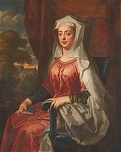
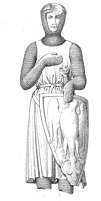
1263 Civil war brews in England as the barons' party arms itself against the king's party, which is aided by Pope Urban IV. The last Norse invasion of Scotland? On July 11 the 120-ship Norwegian leidang (lething) fleet sails W to attack Scotland over control of the Hebrides, and enters the Firth of Clyde in Sept. after doing a little plundering along the way; part of the fleet is then sent to Loch Lomond to plunder Lennox and Menteith, while the main body anchors off Little Cumbrae Island and Largs; too bad, on Sept. 30 a storm wrecks four Norwegian ships, and when Haakon IV himself lands with a small force to salvage the wrecks on Oct. 2, Alexander III's testy Scots arrive, led by Alexander Stewart of Bute and Cowal, 4th High Steward of Scotland (1214-83) fight the Battle of Largs around the mouth of the Gogo Water, forcing the Norsemen back into their ships with small losses, retreating to Orkney on Oct. 29, where they over-winter, after which a delegation of Irish kings invites Haakon to help them rid Ireland of the stankin' English settlers as their new high king, which he declines; on Dec. 16 Haakon IV (b. 1204) dies at the bishop's palace in Kirkwall, and his son Magnus VI (the Law-Mender) (Lagabote) (1238-80) becomes king of Norway (until May 9, 1280), while the Scots push their advantage to force him to give up the Hebrides, and within three years all Viking lands are returned to Alexander, although many Viking families continue to live there, mixing with Scottish clan families moving in. On July 20-24, the Disputation of Barcelona sees Spanish king (1213-76) James I of Aragon host a debate about whether Jesus Christ was the Messiah, featuring Dominican friar (Sephardic Jewish convert) Pablo Christiani (nee Saul) and Spanish Kabbalist Rabbi Nachmanides (Nahmanides) (1194-1270) (Rabbi Moses ben Nachman) (Ramban), who insists that Torah passages claimed by Christians to predict the coming of a Messiah only speak of "Israel/Jacob my servant", meaning the Jewish people as a whole, and never predicted any kind of divine being, with the soundbyte: "I it seems most strange that... the Creator of Heaven and Earth resorted to the womb of a certain Jewish lady, grew there for nine months and was born as an infant, and afterwards grew up and was betrayed into the hands of his enemies who sentenced him to death and executed him, and that afterwards... he came to life and returned to his original place. The mind of a Jew, or any other person, simply cannot tolerate these assertions. If you have listened all your life to the priests who have filled your brain and the marrow of your bones with this doctrine, and it has settled into you because of that accustomed habit, then if you were hearing these ideas for the first time, now, as a grown adult, you would never have accepted them"; Ramban wins the debate and is awarded 300 gold coins by the king, who attends the Sinagoga Major and addresses the Jewish congregants, pissing-off the Christian pop., causing Ramban to go into exile in Palestine; Friar Christiani goes on to campaign against Judaism and beg the king and later Pope Clement IV to ban the Talmud, and get French king Louis IX to enforce the canonical edict requiring Jews to wear special badges. On Nov. 14 grand prince (since 1236) Alexander Nevsky (b. 1220) dies in the town of Gorodets on the Volga River on his way back home from the Golden Horde, and his son Dmitri Alexandrovich (1250-94) becomes grand prince of Vladimir and Novgorod (until 1293) - kissing Mongol foot like his daddy did? Hulagu attempts to invade N of the Caucasus, and suffers a severe defeat. The Battle of Makryplagi (Makry Plagi) is a decisive V for the Latin Principality of Achaea over the Byzantine Empire. The Teutonic Knights are relieved of their vow of poverty by Pope Urban IV - so they will have another reason to kick Orthodox Russian butt and get even for Nevsky? Guy I dies, and his Greek-speaking Herodotus-quoting son John I de la Roche (d. 1280) becomes the last Latin lord of Athens (until 1280). Count (since 1245) Boniface (b. 1245) dies without heirs, and his uncle Peter II "the Little Charlemagne" (1203-68) becomes count of Savoy (until May 15, 1268). Thuringia and Hesse no longer such a big Meissen? Henry III the Illustrious of Meissen finally ends his war with Sophie of Thuringia (begun 1247), and cedes Hesse to her son Henry (Heinrich) I the Child (1244-1308), who becomes the the first male landgrave of Hesse (until Dec. 21, 1308); the landgraviate of Thuringia (sans Hesse) is inherited by the House of Wettin. The great number of appeals to Rome by victims, er, defendants of the Inquisition cause inquisitors gen. to be appointed in Provence, soon followed by territories throughout C-S Europe - the answer is always no? The Polos travel with a Tatar embassy to Kublai Khan's Mongol court in Shangtu (Xanadu). Balliol College at Oxford U. is founded with guidance from the bishop of Durham by Devorguila (Devorguilla) of Galloway (1210-90) and her husband (since 1223) John I de Balliol (Baliol), 5th Baron de Balliol (-1268), parents of future Scottish king John I Balliol; alumni are known for possessing "the tranquil consciousness of an effortless superority", and incl. economist Adam Smith, PM Harold McMillan, and PM Edward Heath. Births: Islamic Sunni fundamentalist scholar (godfather of Wahhabism) Taqi (Taqiyy) ad-Din Ahmad ibn Taymiyyah (d. 1328) on Jan. 22 in Harran, Turkey. Deaths: Savoy count (1253-63) Boniface (b. 1245). Norwegian king (1217-63) Haakon IV (b. 1204) on Dec. 16 in Kirkwall, Orkney. Russian grand prince (1246-63) St. Alexander Nevsky (b. 1220) on Nov. 14 in Gorodets.






1264 The Second Barons' War begins (ends 1267); Henry III and his son Prince Edward fight Henry III's French-born brother-in-law Simon de Montfort, 6th Earl of Leicester, 1st Earl of Chester (1208-65) ("Father of the English Parliament") (son of a famous Albigensian Crusader), resulting in the first elected English Parliament; Rochester Castle, held by royal constable Sir Roger de Leybourne (1215-71) is sieged by Montfort and Gilbert "the Red" de Clare, 7th Earl of Gloucester, 6th Earl of Hertford (1243-95), who raise the siege after a week when Henry III arrives; in Apr. a massacre of Jews in Canterbury, England is led by "Red" Gilbert de Clare. In spring Scottish ambassadors to Magnus VI are rebuffed, causing a Scottish fleet from Galloway to invade the Isle of Man in the summer, and its king Magnus Olafsson (-1265) to submit personally to Alexander III of Scotland. On May 20 Conrad IV dies, and Pope Innocent IV accepts his 12-y.-o. son ("beautiful as Absalom, and speaks good Latin") Conradin (1252-68) as king of Sicily, after he had offered it to Richard of Cornwall, brother of Henry III of England, then Charles of Anjou, then Edmund, son of Henry II of England, who all turn it down for fear of Conrad IV and Manfred; Manfred doesn't like the choice of Conradin and defeats the pope's troops in the Battle of Foggia on Dec. 2. On June 18 the earliest known Irish parliament is held at Kilkea Castle near Castledermont, County Kildare, attended only by prelates and magnates. On Oct. 2 Pope (since 1261) Urban IV dies after instituting the Feast of Corpus Christi; the Mass and the Office are composed by St. Thomas Aquinas. On Oct. 9 after the Muslim pop. surrenders in 1261 after a mo.-long siege, then rebels, Castile captures Jerez (Xerez) de la Frontera, which after the 1492 conquest of Granada becomes one of the most prosperous cities in Andalusia, trading with the ports of Cadiz and Seville, going on to export Sherry fortified wine, which was first produced after the Moors conquered the area in 711 and introduced distillation. On Nov. 16 emperor (since Sept. 17, 1224) Song Li Zong (b. 1205) dies, and on Nov. 16 his nephew Song Du Zong (Zhao Qi) (nee Zhao Mengqi) (1240-74) becomes Nan Song emperor #6 of China (until 1274), going on to face Mongol incursions while indulging in wine and women and leaving affairs to his incompetent minister Jia Sidao (Shixian) (1213-75); each morning all the babes he's bedded have to come pay their respects, and their number soon mounts to 30? Kublai Khan relocates his Mongol capital to Chungto (modern-day Beijing), renaming it Khanbalik (Cambaluc) ("city of the great khan") (until 1368) - did he a stately pleasure dome decree? Emperor Michael VIII Palaelogus sends 50 ships to attack the Venetians in Acre, pissing them off and causing them to attack their Genoese rivals in Tyre, only to give up when reinforcements arrive. Merton College at Oxford U. is founded by Walter de Merton (1205-77), bishop of Rochester and former chancellor to Henry III and Edward I, becoming the first modern college with its self-governing org., with instruction within its walls, going on to become a center for scientific studies, esp. mechanics, nurturing Roger Bacon, Thomas of Bradwardine, Robert Grossteste, Richard Swineshead, et al., and serving as a model for future colleges at Oxford and Cambridge - yah, baby? Architecture: The grave of St. Dominic (b. 1221) proving very popular with pilgrims, Nicola (Niccola) Pisano (1220-78) is commissioned by the Dominicans to design the Arca (Shrine) of St. Dominic in Bologna, Italy; as work progresses and the pilgrims keep a-comin' and pilin' on the bologna, it is systematically improved and adorned until 1768. Nonfiction: Thomas Aquinas (1225-74), Summa Contra Gentiles (1258-64); written at the urging of Dominican gen. Raymond of Penafort; attempts to reason Muslims out of their infidelity between 5x-daily prayers and holy murders, admitting that Christianity cannot be proved by reason but requires faith in the Hebrew and Greek Christian scriptures, but pointing out that it conquered Rome and Europe mainly by persuasion incl. belief in Jesus' miracles, while Islam did it by violence and the preaching of pleasure, with the soundbyte that Muhammad "seduced the people by promises of carnal pleasure to which the concupiscence of the flesh goads us. His teaching also contained precepts that were in conformity with his promises, and he gave free rein to carnal pleasure", adding: "In all this, as is not unexpected, he was obeyed by carnal men... As for proofs of the truth of his doctrine, he brought forward only such as could be grasped by the natural ability of anyone with a very modest wisdom. Indeed, the truths that he taught he mingled with many fables and with doctrines of the greatest falsity"; convinced of the intellectual weakness of Islam's contentions, Aquinas argued: "No wise men, men trained in things divine and human, believed in him from the beginning", and his followers "were brutal men and desert wanderers, utterly ignorant of all divine teaching, through whose numbers Muhammad forced others to become his followers by the violence of his arms"; "Mohammad said that he was sent in the power of his arms, which are signs not lacking even to robbers and tyrants"; he concludes that Muhammad's Islam is merely another Christian heresy, which "perverts almost all the testimonies of the Old and New Testaments by making them into fabrications of his own, as can be seen by anyone who examines his law", and it was "a shrewd decision on his part to forbid his followers to read the Old and New Testaments, lest these books convict him of falsity"; "It is thus clear that those who place any faith in his words believe foolishly." Roger Bacon (1214-94), De Computo Naturali; astronomical work. Births: Scottish prince and heir apparent Alexander (d. 1284) on Jan. 21 in Jedburgh; son of Alexander III and Margaret of England; brother of Margaret Dunkeld (1261-83) and David (1272-81). Deaths: French Dominican scholar Vincent of Beauvais (b. 1190). Chinese Song emperor #14 (1224-64) Li Zong (b. 1205) on Nov. 16 in Lin'an, Zhejiang.
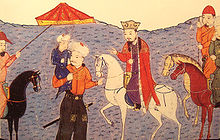




1265 On Feb. 5 Guido (Guy) le Gros (Guy the Fat) (Guy Foulques or Gui Foucois), son of French knight Foulquois is elected Pope (#182) Clement IV (1190-1268) (until Nov. 29, 1268); the must-kiss Fisherman's (Piscatory) Ring, cast in gold with the Pope's Latin name in raised letters around a bas-relief of St. Peter in a boat (Mark 1:17) is first mentioned in a letter by Clement IV to his nephew Peter Grossi; worn on the pope's 4th finger of the right hand, it is used as a signet to seal official papal documents (red wax for private correspondence, a bulla of melted lead for public documents, causing the use of the term "bull") until 1842; it is crushed upon the pope's death by the camerlengo (chamberlain). On Feb. 8 Mongol ruler (since 1256) Hulagu (b. 1217) dies on Shahi Island on Lake Urmia after conquering Persia, and is buried on Kaboudi Island in Lake Urmia, his funeral featuring human sacrifice; his son Abaqa (Abagha) ("paternal uncle") Khan (1234-82) succeeds as Ilkhanate ruler #2 (until 1282) and establishes the initially Buddhist Mongolian Ilkhanid (Il-Khanid) Dynasty in Persia, Iraq, and much of Anatolia (ends 1336), ruling as ilkhan (viceroy) #2 (until 1282), with capital initially at Maragha (Maragheh) (Maraghe) in Azerbaijan, later moved to Tabriz; much of his reign is consumed in civil wars with other Mongols of the N khanate and an invasion of Syria; the Persian Islamic bureaucracy is used to extort taxes from the pop.; the Mongol "holocaust" permanently turns agricultural land to pastoral use, and settles large numbers of Turks in NW Iran (Azerbaijan); the Jews worm their way into the admin. until the anti-Jewish riots of 1291. On May 14 a bunch of pissed-off barons (angry at the rejection of the Provisions of Oxford), led by Simon de Montfort, 6th earl of Leicester (Henry III's brother-in-law) surprises the king's army (assisted by Sir William Sinclair under orders of Alexander III of Scotland), and wins the Battle of Lewes in Sussex, captures Henry III and Prince Edward, and assumes control of the govt., summoning two knights from each shire, and two burgesses (reps.) from each county, city, and borough to a central assembly, becoming the first time that the English middle class has a say in govt., and the birth of the modern British Parliament (c. 1240 the Great Council of the knights of the shire was called parliament, but non-knights were not allowed); on May 15 the Mise (Pact) of Lewes, a return to the reforms of 1258 is agreed on, with a baronial council of nine taking the place of the former council of 15; on June 22 Welsh prince Llywelyn the Last signs the pip-pip Treaty of Pipton with Simon de Montfort, recognizing Welsh independence in return for a 30K-mark payment; too bad, the barons don't like being ruled by a transplanted Frenchie, and the earl of Gloucester flops, helps Prince Edward escape, and together they gather a vastly superior force and defeat ever-sham Simon de Montfort and his barons on Aug. 4 at the Battle of Evesham in Worcestershire; Simon is KIA, Henry III is released and resumes his reign, but Prince Edward is really in control; the baronial govt. and its acts are thrown out, and Edward's attempt to take vengeance prolongs the resistance for two years. Bela IV of Hungary and Ottokar II of Bohemia begin a series of wars (until 1270). Louis IX permits his younger brother Charles of Anjou to accept the crown of Sicily, dragging France into Italian problems, starting with newly-minted Charles I of Anjou (Naples) (1226-85) coming with a large army to Rome, where he is crowned next Jan. 5 as Charles I of Naples and Sicily or the Two Sicilies (Charles of Anjou and Provence); Manfred shakes in his boots. Magnus Olafsson of Man dies, and Alexander III annexes his kingdom, then sends his Scottish fleet around the Hebrides getting rid of Norwegian sympathizers. Italian #1 Roman Catholic theologian Thomas Aquinas ranks sodomy second to murder in sinfulness - you're killing his little angels in your Hell? Architecture: Nicola Pisano designs the pulpit of the Siena Cathedral (finished 1268). Inventions: Franco of Cologne and Pierre de la Croix develop Musica Mensurata (measured music), the musical form of the motet. Nonfiction: Thomas Aquinas (1225-74), Summa Theologica (Summa Totius Theologiae Tripartita) (3 parts) ("On God", "On Man's Moral Life", "On Christ") (1265-73) ("Credo ut intelligam"); synthesizes the works of Aristotle and his followers Averroes, Avicenna et al. with those of Church Fathers St. Augustine et al., and absorbs the teachings of Jewish thinkers Moses Maimonides, Avicebron et al.; contains the pure ambrosia of Roman Catholic Systematic Theology, which ends up capturing the Church's heart to modern times; "Sciences are distinguished by the different methods they use. For the astronomer and the physicist both may prove the same conclusion, that the earth, for instance, is round. The astronomer proves it by means of mathematics, but the physicist proves it by the nature of matter"; discusses the concept of a just price; too bad, the 3rd part is left unfinished?; "If therefore angels are not composed of matter and form, as was said above, it follows that it would be impossible to have two angels of the same species... The motion of an angel can be continuous or discontinuous as it wishes... And thus an angel can be at one instant in one place, and at another instant in another place, not existing at any intermediate time." Nonfiction: Kirakos Gandzaketsi (1200-71), The Journey of King Hetoum of Little Armenia to Mongolia and Back (May 19, 1241-1265); a history of Armenia from the 4th to 12th cent. C.E., becoming a primary source for the Mongol invasions and the first recorded word list of the Mongolian language; becomes a hit and is trans. into many languages - so what about you, Goldilocks, what do you fantasize about? Births: Japanese Yamato emperor #92 (1287-98) Fushimi (Hirohito) (d. 1317) on May 10; 2nd of Go-Fukakusa (1243-1304). Italian Roman Catholic Thomist Beatrice-worshiping "Divine Comedy" (Commedia) poet-writer-philosopher ("Father of the Italian Language") Dante (Durante) Alighieri (nee Durante di Alighiero degli Alighieri) (d. 1321) on May 14 in Florence; baptized inthe Baptistery of St. John in the Piazza del Duomo and Piazzi San Giovanni across from the Florence Cathedral and the Canpanile di Giotto in Florence on Mar. 26, 1266; one of the "three fountains" along with Petrarch and Boccaccio; father Alighiero is a White Guelph, and mother is Bella degli Abati, who dies when he is 7-y.-o., after which Alighiero marries Lapa di Chiarissimo Cialuffi, who bears Dante's brother Francesco and sister Tana (Gaetana). Spanish king of Aragon and count of Barcelona (1285-91) Alfonso III (the Liberal) (the Free) (d. 1291); son of Peter III of Aragon (1239-85) and Constantia of Sicily (1249-1302) (daughter of Manfred of Sicily); great-grandson of Amadeus IV of Savoy. Hungarian king Andras III (d. 1301). Deaths: English wannabe Simon de Montfort, 6th earl of Leicester (b. 1208) on Aug. 4 in Evesham (KIA). Mongol ruler (1251-65) Hulagu Khan (b. 1217) on Feb. 8.

1266 On Jan. 6 Charles I of Anjou (1227-85), younger brother of Louis IX of France is crowned king of the Two Sicilies (Naples and Sicily) at St. Peter's in Rome; on Feb. 26 he defeats and kills King Manfred (b. 1232) at the Battle of Benevento in Campania; Naples opens its gates, he seizes Sicily, and the Angevin Dynasty is founded in Sicily, ending control by the Hohenstaufens (begun 1194); Charles I moves the capital from Palermo to Naples, residing at the Castel_Nuovo; too bad, the godfathers of Sicily don't like them, and plot to oust them from the island (1284). The Treaty of Perth cedes the Isle of Man and the Hebrides from Norway to Scotland for 4K marks and an annual tribute of 100 marks; only Orkney and the Shetland Islands remain Norwegian; Scottish power now extends to the Irish Sea; the new acquisitions are given to infant heir Prince Alexander (1264-84) as an appanage. Hamburg, Germany secures an imperial charter. Niccolo Polo and Maffeo Polo travel to Constantinople. Guillaume de Gisors (1219-1307) succeeds Marie de Saint-Clair as grandmaster of the Priory of Sion (until 1307) :). Inventions: The Bakers Marking Law requires English bakers to begin marking loaves of bread to identify the source of bad bread, becoming the first use of trademarks. Births: Italian Dante's babe and beau ideal Beatrice "Bice" di Folco Portinari (1266-90) in Florence; daughter of Folco di Ricovero Portinari; Dante meets her in 1274 at age 9 and falls in love with her for life, but never gets past the batter's box, and after she marries banker Simone dei Bardi in 1277 at age 24, and he marries in 1285, he immortalizes her in his "Vita Nuova", and in his "Divine Comedy" as the guide to the Beatific Vision in Paradise - I stick with it cause I like it? Deaths: Swedish statesman Birger Jarl (b. 1210) on Oct. 21. Crusader count John of Ibelin (Jaffa) (b. 1215) in Dec. in Jaffa; leaves the Livre des Assises, the longest legal treatise from the here-and-gone Kingdom of Jerusalem. Sicilian king (1258-66) Manfred of Sicily (b. 1232) on Feb. 26 (KIA).
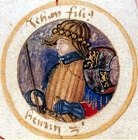

1267 On May 24-27 William II of Villehardouin, prince of Achaea and his former Latin lord Baldwin II of Constantinople acknowledge Charles I of Naples (Sicily) (Anjou) as lord of Achaea in the Treaty (Treaties) of Viterbo, transferring most of the rights of the defunct Latin Empire of Constantinople to him. On Nov. 19 the Statute of Marlborough makes permanent the reforms embodied in the Provisions of Westminster, which is all that remains of the baronial reforms; it survives to modern times as the oldest piece of British statute law not completely repealed; the English Civil War (begun 1257) ends. After making an alliance with Baybars last year, who reneges on a promise of some troops, the Genoese attack Acre, capture the Tower of Flies and blockade the harbor for 12 days before being kicked out by the Venetians. Charles I of Anjou is appointed vicar-gen. of Tuscany, and podest (magistrate) of Florence. Prince Llewelyn the Last signs the Treaty of Montgomery with Henry III of England, winning formal recognition of his enlarged principality of North Wales (all of Wales outside the marches) in return for homage and a tribute of 25K marks, payable 3K a year. John I "the Victorious" (1252-94) becomes duke of Brabant (until May 3, 1294), becoming one of the top feudal princes of his day, fathering many illegitimate children. The Polos travel to Kublai Khan's capital of Kaifeng; Kublai Khan moves his winter capital to Yanjing, where he begins building Khanbalig (Cambuluc) (Peking/Beijing). The Muslim revolt in Andalusia ends. Portugal fixes its border with Castile. Exiled Spanish Kabbalist Rabbi Nachmanides (Nahmanides) (1194-1270) (Rabbi Moses ben Nachman) (Ramban) makes aliyah to Jerusalem and reports that after persecution by the Khwarezmian Tatars there are only two Jewish families left living there, with the soundbyte: "Many are its forsaken places, and great is the desecration. The more sacred the place, the greater the devastation it has suffered. Jerusalem is the most desolate place of all. ... There are ten men who meet on the Sabbaths they hold services at their home. ... Even in its destruction, it is an exceedingly good land"; he immediately founds the Ramban Synagogue in a deserted house in the Jewish Quarter on Mount Zion, which becomes a center of Jewish life, attracting immigrants; ' he goes on to declare it to be obligatory for Jews to make aliyah to Jerusalem, and that peaceful coexistence with Christians and Muslims has its limits, with the soundbyte: "For we were enjoined to destroy those nations if they make war upon us. But if they wish to make peace, we shall make peace with them and let them stay upon certain conditions. But we shall not leve the land in their hands or those of any other nation at any time whatsoever." The Council of Vienna forces Jews to wear the pileum cornutum (a cone-shaped headdress) in addition to a special badge, and forbids Jewish physicians to treat Christians, which doesn't stop Christian popes (Boniface VIII), kings (James I of Aragon, Ferdinand II and Isabella I), monasteries, nunneries et al. from employing them. The Assize of Bread and Ale in England is the first law in England regulating the production and sale of food; to avoid being punished for selling a short-weight loaf, bakers add a 13th loaf to a dozen, becoming known as a baker's dozen; the law is amended in 1822 and 1836 before being repealed in 1863; the Worshipful Co. of Bakers in London enforces the regulations, while brewers are saddled with taxes by the govt., which closely regulates the industry. Goldsmith and tailor guilds fight each other in fierce street battles in London, England. Nonfiction: Roger Bacon (1214-94), Opus Majus (Great Work); an encyclopedic work on experimental science, math, optics, and philosophy, coining the word "almanac" (Arab. "al manakh" = the weather), giving a recipe for gunpowder (41.2% saltpeter, 29.4% charcoal, 29.4% sulfur) (Pt. VI), predicting powered flight, proposing that one day be dropped from the Julian Calendar every 125 years, and containing the soundbyte (Pt. IV): "The sea between the end of Spain on the west and the beginning of India on the east is navigable in a very few days if the wind is favorable", later inspiring Columbus; it concludes with a warning that science cannot save mankind, but that "The science of morality is the mistress of every department of philosophy"; he didn't invent gunpowder, just repeated a formula he got from others - whether they're ground in, smeared on, or powdered, it doesn't matter, that's the power of Gunbarrel Clean? Poetry: Konrad von Wurzburg (1225-87), Der Welt Lohn; Heinrich von Kempten. Births: Japanese Yamato emperor #91 (1274-87) Go-Uda (d. 1324) on Dec. 17; 2nd son of Kameyama (1249-1305). Florentine painter-sculptor-architect ("father of European painting") ("first of the Italian masters") Giotto di Bondone (d. 1337) in Vespignano 14 mi. from Florence; studies under Cimabue; designer of the campanile of the Florence Duomo; breaks away from the stiff medieval style and shows facial emotions on people?; Michelangelo uses him as the foundation of his work? Spanish king of Sicily (1285-96), king of Aragon and Valencia and count of Barcelona (1291-1327), and king of Sardinia and Corsica (1297-1327) James II (the Just) (d. 1327) on Aug. 10 in Valencia; 2nd son of Peter III of Aragon (1239-85) and Constance of Sicily (1249-1302).


1268 With pesky John of Ibelin (d. 1266) out of the way, Sultan Baybars of Egypt captures and destroys the ancient city of Jaffa, then in May conquers Lesser Armenian-held Antioch and compels the pop. to embrace Islam, causing the Patriarchs of Antioch to permanently leave the city and take up residence eventually (1366) in Damascus; after learning that Count Bohemond VI left Antioch before he arrived, Baybars writes a letter to him, with the>soundbyte: "You would have seen your knights prostrate beneath the horses' hooves, your houses stormed by pillagers and ransacked by looters, your wealth weighed by the quintal, your women sold four at a time and bought for a dinar of your own money! You would have seen the crosses in your churches smashed, the pages of the false Testaments scattered, the Patriarchs' tombs overturned. You would have seen your Muslim enemy trampling on the place where you celebrate the Mass, cutting the throats of monks, priests and deacons upon the altars, bringing sudden death to the Patriarchs and slavery to the royal princes. You would have seen fire running through your palaces, your dead burned in this world before going down to the fires of the next, your palace lying unrecognizable, the Church of St. Paul and that of the Cathedral of St. Peter pulled down and destroyed; then you would have said, 'Would that I were dust, and that no letter had ever brought me such tidings!'" On Aug. 23 after 16-y.-o. Conradin (b. 1252) tries to reclaim Sicily, Charles I of Anjou, aided by 400 Achaean knights under his new vassal William II defeats him and his polyglot Italian, Spanish, Roman, Arab, and German army at the Battle of Tagliacozzo in L'Aquila Province, Italy, then captures and executes him in Naples on Oct. 29, ending German Hohenstaufen rule of Sicily (begun 1194); Conradin plays a last game of chess before being permanently mated?; the Anjevin Dynasty secures the papacy against the imperial threat in both N and S Italy until 1343. On Nov. 29 Pope (since 1264) Clement IV dies after reorganizing the Sorbonne in Paris as a theological school, and the papal throne remains vacant for three years (until 1271) as the cardinals of the Conclave of Viterbo diddle around until the townspeople lock them up in the palace where they are staying and put them on a diet of bread and water. Another war between Serbia and Dubrovnik ends in a treaty, with Dubrovnik required to pay an annual tribute for the next cent., freeing Stefan Uros I of Serbia to invade Hungarian territory S of the Danube River in Macva (N of Seria), during which Stefan is captured and forced to pay ransom and marry his son Stefan Dragutin to Catherine (Katalin), daughter of future Steven V of Hungary. After being forced to resign his position as archbishop of Lyons (since 1245), and marrying Countess Palatine Adelaide of Burgundy last June 12, Philip I (1207-85) becomes count of Savoy (until Aug. 16, 1285); in 1272 he acquires the County of Bresse, while fighting a coalition composed of King Rudolph I, Charles of Anjoy, the Counts of Geneva, and the French dauphin. Thomas Aquinas returns to Paris, and immediately gets involved in the controversy caused by philosopher Siger de Brabant (1235-81), a popularizer of Muslim philosopher Averroes at the U. of Paris from 1266-76, whose commentaries on Aristotle upset followers of St. Augustine, who taught that the search for truth shouldn't be based on sense experience, and instead begin to believe that empirical knowledge rules - are you for real? The quaint seaport of Calvi in NW Corsica is founded by the Genoese. In 1286 French king Louis IX enacts enacts beer purity laws, mandating that only "good malt and hops" be used in beer brewing; by the 1300s hops are also used in the Netherlands. Architecture: After occuping the N of Glamorgan, English knight Sir Gilbert "the Red Earl" de Clare, 6th Earl of Hertford, 7th Earl of Gloucester, 3rd Lord of Glamorgan, 9th Lord of Clare (1243-95) begins Caerphilly Castle (Castell Caerffili) in Senghenydd in S Wales (largest in Britain after Windsor Castle)to hold off Welsh prince Llywelyn the Last, bottling him up to the N; after being burnt by Llywelyn in 1270 it is finished in 1290, introducing concentric castle defenses to Britain, along with large gatehouses. Births: French Capetian Babylonian Captivity king (1285-1314) ("the Pest of France" - Dante) Philip IV (Le Bel) (the Fair) (the Handsome) (d. 1314) in Apr.-June in Fontainebleau; son of Philip III (1245-85) and 1st wife Isabella of Aragon (1247-71); husband of Jeanne (Joan) I of Navarre (1273-1305); father of French brother-kings Louis X (1314-16), Philip V (1316-22), and Charles IV (1322-8), and the "She-Wolf of England" Isabelle (1295-1358), who marries Edward II and produces the line of English kings of Edward III, (John of Gaunt), Henry IV, Henry V, and Henry VI. Norwegian king (1280-99) Eric (Erik) II Magnusson (the Priest-Hater) (d. 1299); son of Magnus VI (1238-80) and Ingebord Ericsdatter (daughter of Eric IV of Denmark), descendant of Olav II. Monaco Grimaldi prince #1 (1297-1301) Rainier I, Lord of Cagnes (d. 1314); father of Charles I (-1357). Deaths: Savoy count (1203-68) Peter II (b. 1203) on May 15 in Chateau de Chillon (Pierre-Chatel?). German Hohenstaufen king of Sicily (1254-8, 1268) Conradin (b. 1252) on Oct. 29 in Naples (executed). English lord John de Balliol, 5th Baron de Balliol (b. ?) on Oct. 25; leaves an endowment for Balliol College at Oxford. English ecclesiastic-jurist Henry de Bracton (b. ?); chancellor of Exeter Cathedral since 1264.



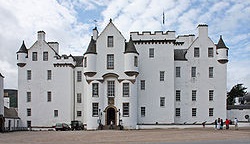
1269 In Feb. the Mongols build a fortress E of the Han River to block the water supply, then siege the walled cities of Xiangyang and Fancheng in Hubei Province, the last two strongholds of the Nan Song (until 1273); both sides use explosives in the fighting (first time in history?). Hethrourn I the Great dies, and Levon (Leon) III (1236-89), son of Hetum I becomes ruler of Lesser Armenia (until 12389). Ottokar II takes advantage of the interregnum in the German Empire to acquire Istria, Carinthia and Carniola from Hungary. The Almohad Dynasty in Africa ends. The Polos return from the court of Kublai Khan with a letter from him to the pope; meanwhile after Kublai Khan commissions Tibetan monk Tibetan monk Drogon Chogyal Phagpa (1235-80) to develop a new writing system for Mongol (Yuan) China, he develops the 'Phags pa script, which becomes the empire's official writing system, replacing Chinese characters and the Old Uyghur alphabet; too bad, it isn't widely accepted and falls into disuse after the collapse of the Yuan Empire to the Ming Dynasty in 1368; Phagpa is rewarded with the title of imperial preceptor next year. Toll roads are introduced in England. Louis IX of France orders Jews to wear a purple badge. Louis IX founds the Order of the Ship and the Double Crescent (Sea Shell) for nobles who accompanied him on his ill-fated Seventh Crusade. John de Baliol, head of Barnard Castle in Scotland dies, and his widow Lady Devorguila begins carrying his embalmed heart in a small ivory casket, calling it her "sweet heart and silent companion", and instructing that it be placed on her breast in her coffin, becoming the origin of the term "sweetheart"? Architecture: The rebuilding of Westminster Abbey (in the new Gothic style) is begun by Henry III. Blair Castle near Blair Atholl in Perthsire, N Scotland between Edinburgh and Inverness is begun by John I Comyn, Lord of Badenoch (-1275), and taken over by David I Strathbogie, Earl of Atholl (-1270) while he is away on Crusade, becoming the ancestral home of Clan Murray and their chiefs, the dukes of Atholl; Queen Victoria later grants the dukes the exclusive privilege of maintaining a private army. Inventions: Petrus Peregrinus (Pierre Pelerin) de Maricourt (Peter the Pilgrim) pub. Epistola de Magnete, the first scientific treatise, describing his experiments with magnets, naming the north and south poles, formulating the law that poles of opposite polarity attract while poles of like polarity repel, describing experiments in magnetizing objects, along with his invention of the 360 degree compass, and a project to build a perpetual motion machine with self-regenerating magnets. Deaths: Italian #1 Lombard troubadour Sordello (Sordell) da Goito (Goit) (b. ?) near Goito, Mantua; mentioned in Dante's "Divine Comedy".